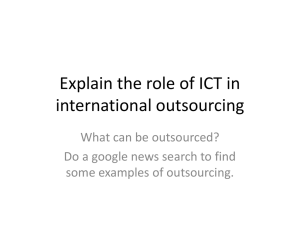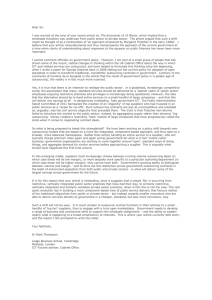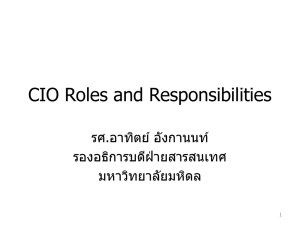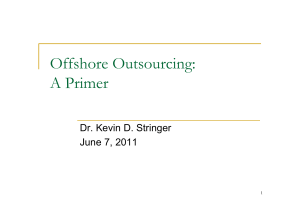Offshore Outsourcing: The Economist`s View
advertisement
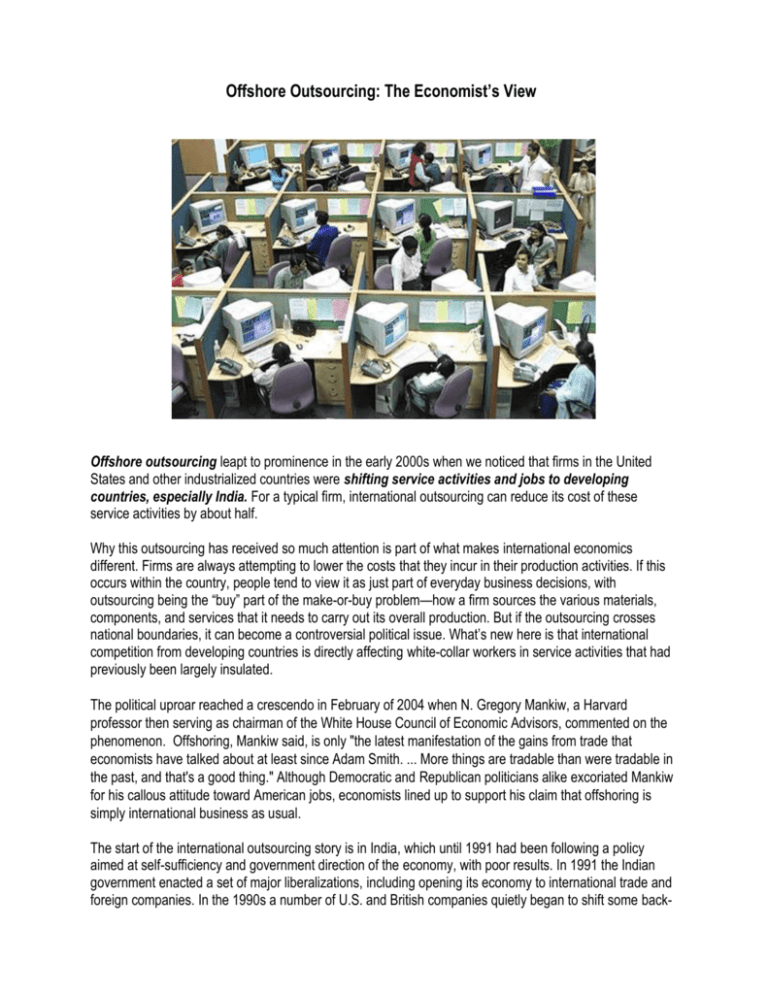
Offshore Outsourcing: The Economist’s View Offshore outsourcing leapt to prominence in the early 2000s when we noticed that firms in the United States and other industrialized countries were shifting service activities and jobs to developing countries, especially India. For a typical firm, international outsourcing can reduce its cost of these service activities by about half. Why this outsourcing has received so much attention is part of what makes international economics different. Firms are always attempting to lower the costs that they incur in their production activities. If this occurs within the country, people tend to view it as just part of everyday business decisions, with outsourcing being the “buy” part of the make-or-buy problem—how a firm sources the various materials, components, and services that it needs to carry out its overall production. But if the outsourcing crosses national boundaries, it can become a controversial political issue. What’s new here is that international competition from developing countries is directly affecting white-collar workers in service activities that had previously been largely insulated. The political uproar reached a crescendo in February of 2004 when N. Gregory Mankiw, a Harvard professor then serving as chairman of the White House Council of Economic Advisors, commented on the phenomenon. Offshoring, Mankiw said, is only "the latest manifestation of the gains from trade that economists have talked about at least since Adam Smith. ... More things are tradable than were tradable in the past, and that's a good thing." Although Democratic and Republican politicians alike excoriated Mankiw for his callous attitude toward American jobs, economists lined up to support his claim that offshoring is simply international business as usual. The start of the international outsourcing story is in India, which until 1991 had been following a policy aimed at self-sufficiency and government direction of the economy, with poor results. In 1991 the Indian government enacted a set of major liberalizations, including opening its economy to international trade and foreign companies. In the 1990s a number of U.S. and British companies quietly began to shift some back- 2 office work, like payroll processing to India, to take advantage of the availability of low-cost but educated workers who could speak English. Other firms, including Indian firms like Wipro and Infosys, noticed how successful this was, and began to expand the business further. At the same time the cost of voice and data transmission plummeted (a cost decline of more than 80 percent since 2000) as the bandwidth in place between India and the United States and Britain increased rapidly. This international outsourcing includes a range of business services, including data entry, telephone call centers, and software development. Firms in the United States and Britain are the largest users of international outsourcing. In addition to India, the Philippines, China, Russia, and the countries of Central Europe are also important providers. Is Offshore Outsourcing of Services a Large Problem? How large is this offshore outsourcing? It seems to be rather surprisingly small for all the attention that it has received, though it is growing. A reasonable estimate is that by 2005 perhaps 600,000 service jobs (in total, not per year) had been shifted from the United States to India and other developing countries, a number which is less than one percent of service sector jobs in the United States. Another way to gain perspective on this number is to compare it to the flow of job gains and losses in the U.S. economy. Each year about 30 million people lose or quit their jobs (and usually more than 30 million new jobs are filled). Which kinds of jobs have been affected, or might be affected in the future? The jobs that are being outsourced overseas generally involve work that is repetitive and routine. In the United States offshoring seems to be a driver behind the decline in the number of lower-paid and somewhat less-skilled white-collar positions such as data entry keyers, phone operators in call centers, and computer programmers. Even though there is some offshoring of higher paid and more skilled positions in the computer services area, the number of U.S. workers in such positions as computer software engineers has increased since the late 1990s, and their wages have risen faster than the economy average. Further, the United States overall is a large net exporter of business services [exports exceed imports]. U.S. firms actually gain much business though the consequent “inshoring” of work in such areas as computer consulting, research, architectural design, industrial engineering, legal services, and production and distribution of movies, videos, and records. The jobs gained from exports of services appear to be more skilled and higher paying than service sector jobs in general: in 2002, business service firms that exported paid an average annual salary of $63,000 compared to a $43,000 salary paid by business service firms that did not export. More generally, there is a limited range of service jobs that can be offshored because positions that require substantial face-to-face contact with customers or in-depth local knowledge cannot readily be done overseas. Essentially, the work that is most readily offshored is work that can flow internationally over wires. Economist Alan Blinder estimates that the sectors in which jobs will be most vulnerable to outsourcing in the future, besides computer services, are financial services (selling insurance and financial products in which people can invest their savings), information services (telephone operators and help desks), and professional and business services (like accounting). Most health care services cannot be outsourced. But there are exceptions such as radiology (reading x-rays is somewhat repetitive and the results can be delivered electronically). More generally, laboratory tests are already outsourced by most physicians. Why not out of the country rather than just out of town? And with a little imagination, one can envision other medical procedures being performed by doctors who are thousands of miles away. Indeed, some surgery has already been performed by robots controlled by doctors via fiber-optic links. Educational services are 3 also best delivered face to face, but they are becoming increasingly expensive. Electronic delivery will probably never replace personal contact in K-12 education, which is where the vast majority of the educational jobs are. But college teaching is more vulnerable. As college tuition grows ever more expensive, cheap electronic delivery will start looking more and more sensible, if not imperative. The leisure and hospitality industries seem much safer. If you vacation in Florida, you do not want the beach boy or the maid to be in China. Reservation clerks can be (and are) located anywhere. But on balance, only a few of these jobs can be moved offshore. Retail trade likewise is difficult to outsource; it is helpful if your waiter and your plumber provide their services in person. In total it appears that in the range of 11–18 percent of service sector jobs are potentially affected by international outsourcing, and most likely the actual number that will be offshored will be much less than this. Does the Nation as a Whole Benefit or Lose from Offshore Outsourcing? To date, the media's coverage of outsourcing has focused on its perceived costs, specifically, the white collar jobs that have been “lost.” This leaves out more than half of the story. The benefits of offshore outsourcing should not be dismissed. The standard case for free trade holds that countries are best off when they focus on sectors in which they have a comparative advantage -- that is, sectors that have the lowest opportunity costs of production. Allowing countries to specialize accordingly increases productivity across all countries. This specialization translates into cheaper goods, and a greater variety of them, for all consumers. The current trend of outsourcing business processes overseas is comparative advantage at work. The main driver of productivity gains over the past decade has been the spread of information technology across the economy. The commoditization of simple business services allows those benefits to spread further, making growth even greater. The data affirm this benefit. Catherine Mann of the Institute for International Economics conservatively estimates that the globalization of information technology (IT) production (producing the physical components of a computer) has boosted U.S. GDP by $230 billion over the past seven years; the globalization of IT services (programming and so on) should lead to a similar increase. As the price of IT services declines, sectors that have yet to exploit them to their fullest -- such as construction and health care -- will begin to do so, thus lowering their costs of production and improving the quality of their output. (For example, cheaper IT could one day save lives by reducing the number of "adverse drug events." Mann estimates that adding bar codes to prescription drugs and instituting an electronic medical record system could reduce the annual number of such events by more than 80,000 in the United States alone.) McKinsey Global Institute has estimated that for every dollar spent on outsourcing to India, the United States reaps between $1.12 and $1.14 in benefits. Thanks to outsourcing, U.S. firms save money and become more profitable, benefiting shareholders and increasing returns on investment. Foreign facilities boost demand for U.S. products, such as computers and telecommunications equipment, necessary for their outsourced function. And U.S. labor can be reallocated to more competitive, better-paying jobs; for example, although 70,000 computer programmers lost their jobs between 1999 and 2003, more than 115,000 computer software engineers found higher-paying jobs during that same period. Outsourcing thus enhances the competitiveness of the U.S. service sector (which accounts for 30 percent of the total value of U.S. exports). 4 A couple of anecdotes may make the benefits clearer, particularly the fact that outsourcing can create new, better-paying jobs in the U.S. For example, in the 1990’s, Information Management Consultants (IMC) of Reston, Virginia, considered producing software that would allow biotech companies to exploit better the new human genome research. The project seemed financially nonviable (too expensive) if undertaken entirely in the United States. But having its Indian subsidiary do the bulk of the coding work made the project viable. The outcome was a thriving line of business in bioinformatics for IMC and employment at six-figure salaries in the United States. For each engineer in India, the firm employed six engineers in the U.S. in 2004. The case of IBM reinforces this lesson: although critics highlighted its announcement in 2004 to outsource 3,000 IT jobs, they failed to mention the company's plans to add 4,500 positions to its U.S. payroll. Large software companies such as Microsoft and Oracle have simultaneously increased outsourcing and domestic payrolls. Overall, the U.S. economy is very likely to benefit from international outsourcing of services, because it allows Americans to replace high-cost domestic production with lower-cost foreign provision of these services. This is the essence of comparative advantage as a basis for international trade and the gains from trading. What, if Anything, Should the Government Do? While the benefits of offshoring to the nation probably outweigh the costs, more U.S. workers in the future are likely to be hurt by it as technological change continues to make more services tradable and developing countries improve their levels of education and therefore the services they can provide. What can be done to help U.S. workers transition to new jobs? It is easier to describe the broad contours of a solution than to prescribe specific remedies. Most obvious is what to avoid: protectionist barriers against offshoring. Building walls against conventional trade in physical goods is hard enough. Humankind's natural propensity to truck and barter, plus the power of comparative advantage, tends to undermine such efforts -- which not only end in failure but also cause wide-ranging collateral damage. But it is vastly harder (read "impossible") to stop electronic trade. There are just too many "ports" to monitor. The Coast Guard cannot interdict "shipments" of electronic services delivered via the Internet. Governments could probably do a great deal of harm by trying to block such trade, but in the end they would not succeed in repealing the laws of economics, or in holding back the forces of history. What, then, are some more constructive -- and promising -- approaches to limiting the disruption? In the first place, rich countries such as the United States will have to reorganize the nature of work to exploit their big advantage in nontradable services: those that are close to where the money is. That will mean, in part, specializing more in the delivery of services where personal presence is either imperative or highly beneficial. Thus, the U.S. work force of the future will likely have more divorce lawyers and fewer attorneys who write routine contracts, more internists and fewer radiologists, more salespeople and fewer typists. The market system is very good at making adjustments like these, even massive ones. It has done so before and will do so again. But it takes time and can move in unpredictable ways. Furthermore, massive transformations in the nature of work tend to bring wrenching social changes in their wake. In the second place, the United States and other rich nations will have to transform their educational systems so as to prepare workers for the jobs that will actually exist in their societies. Simply providing more education is probably a good thing on balance, especially if a more educated labor force is a more 5 flexible labor force, one that can cope more readily with non-routine tasks and occupational change. However, the jobs that will be least vulnerable to offshoring will require interpersonal communication and therefore people skills may become more valuable than computer skills over time. The geeks may not inherit the earth after all -- at least not the highly paid geeks in the rich countries. Creativity will also be prized. Thomas Friedman has rightly emphasized that it is necessary to steer youth away from tasks that are routine or prone to routinization into work that requires real imagination. Unfortunately, creativity and imagination are notoriously difficult to teach in schools -- although, in this respect, the United States does seem to have a leg up on countries such as Germany and Japan. More vocational education is probably also in order. Nurses, carpenters, and plumbers are already scarce, and these jobs, which are difficult to offshore, are likely to grow over time. One other important step for rich countries is to rethink the currently inadequate programs for trade adjustment assistance. Up to now, the performance of trade adjustment assistance has been disappointing. As more and more Americans -- and Britons, and Germans, and Japanese -- are faced with the necessity of adjusting to the dislocations caused by offshoring, these programs must become both bigger and better. Thinking about adjustment assistance more broadly, the United States may have to repair and thicken the tattered safety net that supports workers who fall off the labor-market trapeze -- improving programs ranging from unemployment insurance to job retraining, health insurance, pensions, and right down to public assistance. At present, the United States has one of the thinnest social safety nets in the industrialized world, and there seems to be little if any political force seeking to improve it. But this may change if a larger fraction of the population starts falling into the safety net more often. The corresponding problem for western Europe is different. By U.S. standards, the social safety nets there are broad and deep. The question is, are they affordable, even now? And if so, will they remain affordable if they come to be utilized more heavily? Offshore outsourcing of services has and will continue to impart benefits to the U.S. economy. Some people will clearly be hurt by it, and they should be supported by public policy initiatives. However, trying to stop it would be counterproductive. REFERENCES Bhagwati, Jagdish and Alan S. Blinder. Offshoring of American Jobs. Cambridge, MA: MIT Press. 2009. Bhagwati, Jagdish, Arvind Panagariya, and T. N. Srinivasan. “The Muddles over Outsourcing.” The Journal of Economic Perspectives, Fall 2004. Blinder, Alan S. “Offshoring: The Next Revolution?” Foreign Affairs, March/April 2006. Drezner, Daniel W. “The Outsourcing Bogeyman.” Foreign Affairs, May/June 2004. Jensen, J. Bradford and Lori G. Kletzer. “ ‘Fear’ and Offshoring: The Scope and Potential Impact of Imports and Exports of Services.” Peterson Institute of International Economics Policy Brief, January 2008. Pugel, Thomas A. International Economics. 14th edition. 2009.


